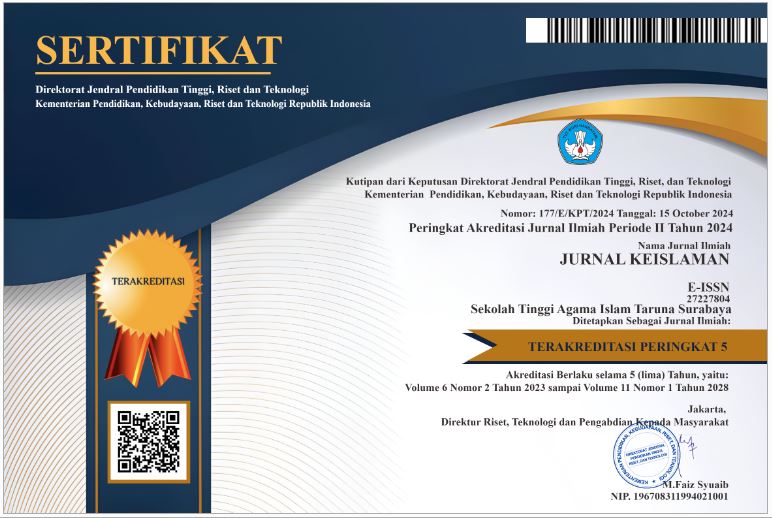Pembangunan Industri Makanan Halal dalam Perspektif Hukum Islam
DOI:
https://doi.org/10.54298/jk.v7i2.270Keywords:
Halal Food Industry, adherence to sharia principles, the perspective of Islamic lawAbstract
This study examines the development of the halal food industry in Indonesia from the perspective of Islamic law. As the country with the largest Muslim population in the world, Indonesia's growth in the halal food sector has significant implications for adherence to sharia principles. The study explores how Islamic law impacts various aspects of the halal food industry, including certification processes, production standards, and product labeling. The main focus is on the application of halal principles throughout all stages of production, from raw material selection to final processing. The study also evaluates the role of sharia supervisory bodies, such as the Indonesian Ulema Council (MUI), in ensuring compliance with Islamic law. The findings reveal that the application of Islamic law in the halal food industry not only ensures adherence to sharia principles but also enhances consumer trust and strengthens Indonesia’s position as a global hub for the halal food industry. This study provides insights into the challenges and opportunities in advancing the halal food industry in accordance with Islamic law in Indonesia
Downloads
References
Abdussamad, Zuchri Metode Penelitian Kualitatif (Makassar: Syakir Media Press, 2021), hlm. 90.
Bakar, A., Pratami, A., & Sukma, A. P. (2021). Analisis fiqih industri halal. Taushiah, 11(1), 1– 13.
Fathoni, M. A. (2020). Potret Industri Halal Indonesia: Peluang dan Tantangan. Jurnal Ilmiah Ekonomi Islam, 6(3), 428. https://doi.org/10.29040/jiei.v6i3.1146
Hukum, F., Muhamadiyah, U., & Utara, S. (2020). Pengembangan Produk Halal Dalam Memenuhi Gaya Hidup Halal (Halal Lifestyle). Iuris Studia: Jurnal Kajian Hukum, 1(1), 14–20. https://doi.org/10.55357/is.v1i1.16
Kurniasari, E. (2021). Prospek Masa Depan Bank Syariah di Indonesia Pasca Pemergeran Bank- Bank Syariah BUMN. Rechtenstudent, 2(1), 35–45. https://doi.org/10.35719/rch.v2i1.52
Noordin, N., Noor, N. L., & Samicho, Z. (2014). Strategic Approach to Halal Certification System: An Ecosystem Perspective. International Halal Conference, PWTC (pp. 79-95). Kuala Lumpur: Procedia - Social and Behavioral Sciences 121
Saputri, O. B. (2020). Pemetaan Potensi Indonesia Sebagai Pusat Industri Halal Dunia. Jurnal Masharif Al-Syariah: Jurnal Ekonomi Dan Perbankan Syariah, 5(2), 23–38. http://journal.um-surabaya.ac.id/index.php/Mas/article/view/5127/4010
Wahyu, A. R. M., & Anwar, W. A. (2020). Dewan Pengawasan Syariah Pada Bank Syariah (Tinjauan Undang-Undang Perbankan Syariah). Al-Azhar Journal of Islamic Economics, 2(2), 82–93. https://doi.org/10.37146/ajie.v2i2.44
Yuliawati, T., Adirestuty, F., Miftahuddin, A., & Hardiansyah, K. (2022). Kebijakan Merger Bank pada Perbankan Syariah: Studi Bibliometrik dan Perspektif Kritis. Jurnal Inspirasi, 13(1), 137–155. https://doi.org/10.35880/inspirasi.v13i1.1979
Downloads
Published
How to Cite
Issue
Section
License
Copyright (c) 2024 M. Shaiful Umam, Nur Faizah

This work is licensed under a Creative Commons Attribution-ShareAlike 4.0 International License.
Authors who publish with this journal agree to the following terms:
- Authors retain copyright and grant the journal right of first publication with the work simultaneously licensed under a Creative Commons Attribution-ShareAlike 4.0 that allows others to share the work with an acknowledgement of the work's authorship and initial publication in this journal.
- Authors are able to enter into separate, additional contractual arrangements for the non-exclusive distribution of the journal's published version of the work (e.g., post it to an institutional repository or publish it in a book), with an acknowledgement of its initial publication in this journal.
- Authors are permitted and encouraged to post their work online (e.g., in institutional repositories or on their website) prior to and during the submission process, as it can lead to productive exchanges, as well as earlier and greater citation of published work (See The Effect of Open Access).


















